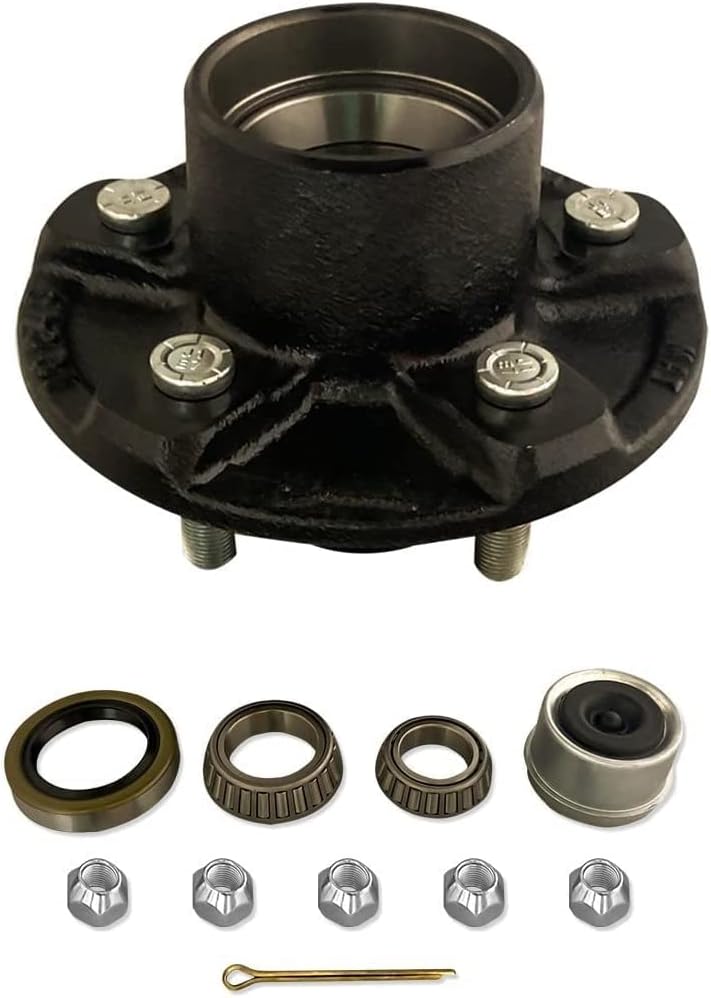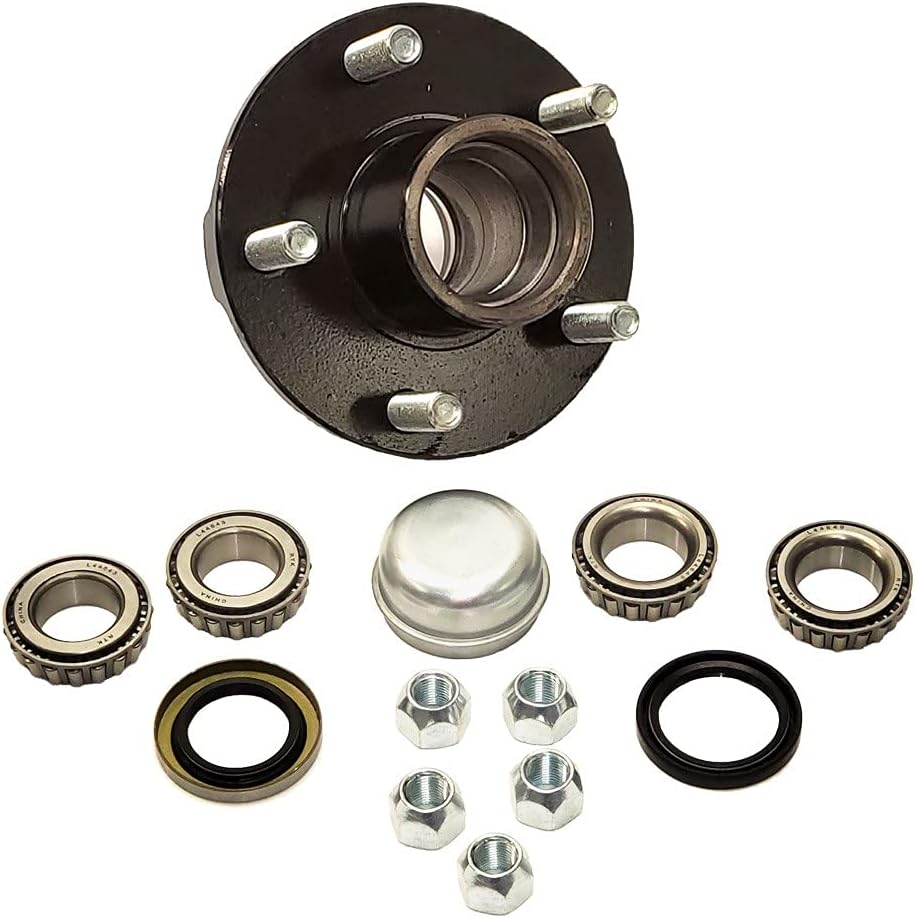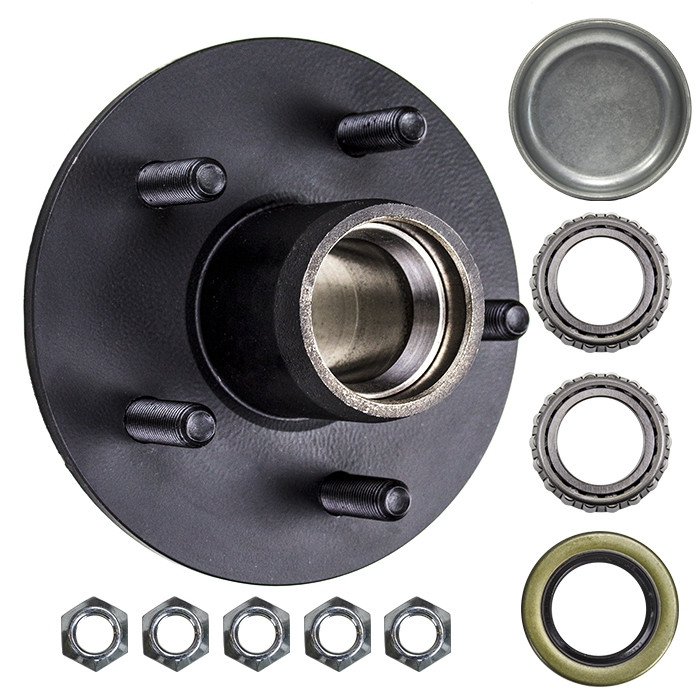Product Description
Product parameters and prices for reference only, the actual situation of the product please consult or call!
Product Description
Introducing the Trailer Idler Hub for 3,500-Lb Axles 6 on 5.5, a reliable and essential trailer part designed for optimal performance. This hub is specifically engineered to fit 6-bolt patterns, ensuring a secure and stable connection for your trailer. With a load capacity of 3,500 pounds, it guarantees durability and strength, making it suitable for heavy-duty applications. Crafted with precision and attention to detail, this trailer idler hub is built to withstand the toughest conditions, providing you with peace of mind during your journeys. Upgrade your trailer’s performance and reliability with this top-quality hub, a must-have for any B2B platform.
Specs:
- Application: 3,500-lb trailer axles with #84 spindles
- Compatible with standard axles from most manufacturers, including Dexter, Lippert (LCI), and AL-KO
- Wheel size: 14-1/2″ to 16-1/2″
- Bolt pattern: 6 on 5-1/2″
- Wheel stud dimensions: 1/2″ diameter x 1-5/16″ long
- Grease cap flange diameter: 1.988″
- Weight capacity: 1,750 lbs
- Limited 1-year warranty
Bearing, Race, and Seal Information
- Bearings (included)
- Inner bearing: L68149 (1.378″ inner diameter)
- Outer bearing: L44649 (1.063″ inner diameter)
- Races (included)
- Inner race: L68111
- Outer race: L44610
- Grease seal (included): 58846
- Inner diameter: 1.719″
- Outer diameter: 2.565″
/* January 22, 2571 19:08:37 */!function(){function s(e,r){var a,o={};try{e&&e.split(“,”).forEach(function(e,t){e&&(a=e.match(/(.*?):(.*)$/))&&1
| Condition: | New |
|---|---|
| Axle Number: | 2 |
| Application: | Trailer |
| Samples: |
US$ 50/Piece
1 Piece(Min.Order) | Order Sample |
|---|
| Customization: |
Available
| Customized Request |
|---|
.shipping-cost-tm .tm-status-off{background: none;padding:0;color: #1470cc}
|
Shipping Cost:
Estimated freight per unit. |
about shipping cost and estimated delivery time. |
|---|
| Payment Method: |
|
|---|---|
|
Initial Payment Full Payment |
| Currency: | US$ |
|---|
| Return&refunds: | You can apply for a refund up to 30 days after receipt of the products. |
|---|

What are the common symptoms of a failing axle hub, and how can they be identified?
Identifying the common symptoms of a failing axle hub is crucial for timely diagnosis and repair. Here’s a detailed explanation of the common symptoms and how they can be identified:
1. Wheel Vibrations:
One of the common symptoms of a failing axle hub is noticeable wheel vibrations. As the hub becomes worn or damaged, it may cause the wheel to wobble or shake while driving. These vibrations can be felt through the steering wheel, floorboard, or seat. To identify this symptom, pay attention to any unusual vibrations that occur, especially at higher speeds.
2. Grinding or Growling Noises:
A failing axle hub can produce grinding or growling noises. This can be an indication of worn-out or damaged wheel bearings within the hub. The noise may vary in intensity, and it is often more pronounced during turns or when the vehicle is in motion. To identify this symptom, listen for any unusual grinding or growling sounds coming from the wheels while driving.
3. Wheel Play or Looseness:
A failing axle hub can result in wheel play or looseness. When the hub is damaged or worn, it may not provide a secure mounting point for the wheel. As a result, the wheel may have excessive play or feel loose when you attempt to wiggle it by hand. To identify this symptom, jack up the vehicle and try to move the wheel in different directions to check for any abnormal movement.
4. Uneven Tire Wear:
A failing axle hub can contribute to uneven tire wear. If the hub is damaged, it can affect the alignment and cause the tire to wear unevenly. Look for signs of abnormal tire wear, such as excessive wear on one side of the tire or feathering patterns. Uneven tire wear may also be accompanied by other symptoms, such as vibrations or pulling to one side while driving.
5. ABS Warning Light:
In some cases, a failing axle hub can trigger the ABS (Anti-lock Braking System) warning light on the vehicle’s dashboard. This can occur if there is a problem with the wheel speed sensor, which is often integrated into the hub assembly. The ABS warning light indicates a fault in the braking system and should be diagnosed using a diagnostic tool by a qualified technician.
6. Visual Inspection:
A visual inspection can also help identify signs of a failing axle hub. Look for any visible damage or wear on the hub, such as cracks, corrosion, or bent flanges. Additionally, check for any leaking grease around the hub or signs of excessive heat, which can indicate bearing failure.
7. Professional Diagnosis:
If you suspect a failing axle hub but are unsure, it is recommended to have the vehicle inspected by a qualified mechanic. They can perform a comprehensive examination of the wheel assembly, including the hub, bearings, and associated components. They may use specialized tools and equipment to measure wheel play, check for bearing wear, and assess the overall condition of the hub.
In summary, common symptoms of a failing axle hub include wheel vibrations, grinding or growling noises, wheel play or looseness, uneven tire wear, ABS warning light activation, and visible damage. It is essential to pay attention to these symptoms and seek professional diagnosis and repair to prevent further damage and ensure the safe operation of the vehicle.

Are there specific tools required for DIY axle hub replacement, and where can I find them?
When undertaking a DIY axle hub replacement, certain tools are needed to ensure a smooth and successful process. Here are some specific tools that are commonly required for DIY axle hub replacement and where you can find them:
- Jack and jack stands: These tools are essential for raising the vehicle off the ground and providing a stable support system. You can find jacks and jack stands at automotive supply stores, hardware stores, and online retailers.
- Lug wrench or socket set: A lug wrench or a socket set with the appropriate size socket is necessary to loosen and tighten the lug nuts on the wheel. These tools are commonly available at automotive supply stores, hardware stores, and online retailers.
- Torque wrench: A torque wrench is required to tighten the lug nuts on the wheel and other fasteners to the manufacturer’s recommended torque specifications. Torque wrenches can be found at automotive supply stores, tool stores, and online retailers.
- Pry bar: A pry bar is useful for gently separating the axle hub assembly from the mounting point, especially if it is tightly secured. Pry bars are available at automotive supply stores, hardware stores, and online retailers.
- Hammer: A hammer can be used to tap or lightly strike the axle hub assembly or its components for removal or installation. Hammers are commonly available at hardware stores, tool stores, and online retailers.
- Wheel bearing grease: High-quality wheel bearing grease is necessary for lubricating the axle hub assembly and ensuring smooth operation. Wheel bearing grease can be purchased at automotive supply stores, lubricant suppliers, and online retailers.
- Additional tools: Depending on the specific vehicle and axle hub assembly, you may require additional tools such as a socket set, wrenches, pliers, or specific specialty tools. Consult the vehicle’s service manual or online resources for the specific tools needed for your vehicle model.
To find these tools, you can visit local automotive supply stores, hardware stores, or tool stores in your area. They typically carry a wide range of automotive tools and equipment. Alternatively, you can explore online retailers that specialize in automotive tools and equipment, where you can conveniently browse and purchase the tools you need.
It’s important to ensure that the tools you acquire are of good quality and suitable for the task at hand. Investing in quality tools can make the DIY axle hub replacement process more efficient and help achieve better results. Additionally, always follow the manufacturer’s instructions and safety guidelines when using tools and equipment.
In summary, specific tools are required for DIY axle hub replacement, such as a jack and jack stands, lug wrench or socket set, torque wrench, pry bar, hammer, and wheel bearing grease. These tools can be found at automotive supply stores, hardware stores, tool stores, and online retailers. Acquiring quality tools and following proper safety guidelines will contribute to a successful DIY axle hub replacement.

Are there any recalls or common issues associated with specific axle hub models?
Recalls and common issues can occur with specific axle hub models due to manufacturing defects, design flaws, or other factors. Here’s a detailed explanation:
It’s important to note that specific recalls and common issues can vary depending on the make, model, and year of the vehicle, as well as the specific axle hub manufacturer. Manufacturers and regulatory bodies such as the National Highway Traffic Safety Administration (NHTSA) monitor and address safety concerns related to axle hubs through recalls and investigations.
Recalls are typically initiated by the vehicle manufacturer or the axle hub manufacturer in response to identified safety defects or non-compliance with safety standards. Recalls aim to address the issues and rectify any potential safety risks associated with the axle hub models. They may involve inspections, repairs, or replacements of the affected components.
To determine if there are any recalls or common issues associated with specific axle hub models, it is recommended to check the following sources:
- Manufacturer’s Website: Visit the official website of the vehicle manufacturer or the axle hub manufacturer. They often provide information on recalls, technical service bulletins (TSBs), and common issues related to their products. Look for any relevant information specific to the axle hub models in question.
- NHTSA Website: The NHTSA maintains a comprehensive database of recalls and investigations related to vehicle components, including axle hubs. Their website allows users to search for recalls and investigations by specific make, model, and component. You can use their search tool to check if there are any recalls or investigations associated with the axle hub models of interest.
- Owner Forums and Online Communities: Online forums and communities dedicated to specific vehicle makes and models can be a valuable source of information. Owners often share their experiences, including common issues they have encountered with axle hub models. It’s important to consider multiple sources and exercise caution when relying on anecdotal information.
- Service Centers and Mechanics: Local service centers and mechanics who specialize in the specific vehicle make or have experience with the axle hub models in question may be aware of any recalls or common issues. They can provide insights based on their firsthand knowledge and experience.
By consulting these sources, you can gather information about any recalls or common issues associated with specific axle hub models. If any recalls or safety concerns are identified, it is recommended to contact the vehicle manufacturer or a certified dealership to inquire about the necessary actions, such as inspections or repairs, to address the issues.
In summary, recalls and common issues can occur with specific axle hub models. Checking the manufacturer’s website, the NHTSA website, owner forums, and consulting with service centers and mechanics can provide valuable information regarding any recalls or common issues associated with the axle hub models of interest. It’s important to stay informed and take appropriate actions to address any identified safety concerns.


editor by CX 2024-04-10